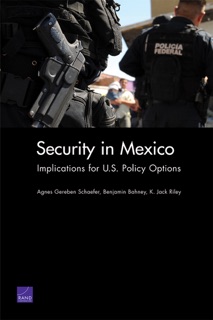The security structure in Mexico is characterized by shifting responsibilities, duplication of services, and general instability, along with a lack of coordination among federal, state, and local security forces. The backdrop of a deteriorating security situation in Mexico and change in administration in the United States demands a closer examination of potential priorities and policy options to guide future U.S.-Mexico relations. U.S. aid to Mexico has typically focused on a narrow set of outputs—improved technology, training, and equipment to prevent drug trafficking. Despite these efforts, Mexico’s security situation continues to deteriorate. To help inform debate, this study examined a set of policy options for the United States (strategic partnership, status quo, and retrenchment), along with promising potential policy priorities (help Mexico streamline delivery of security services, bridge the gap between federal and local security, support Mexico’s efforts to address domestic security concerns, and build trust in security institutions). Problems related to drug and human trafficking, corruption, weapon smuggling, and gang violence have spilled into the United States, reaching far beyond the border. For this and other reasons, the United States has a significant stake in the success or failure of Mexico’s security reform measures.









